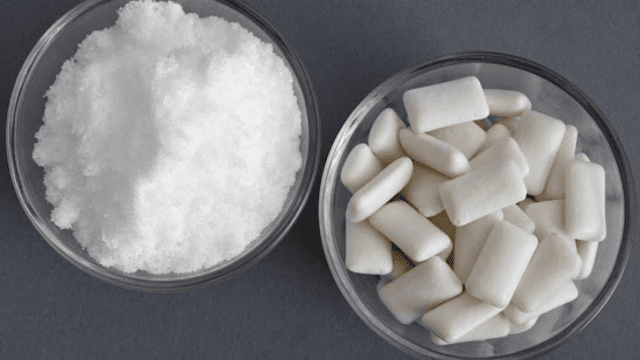What is xylitol, simply put xylitol is a carbohydrate that is present in considerable quantities primarily in birch trees and in many fibrous foods including berries, fruits, mushrooms, and vegetables. It looks like sugar and tastes almost the same. Chemically, it is similar to pentanol with a simple chemical structure (C5 H11 OH). This is the so-called ‘sugar alcohol’, the sweetest of alcohol. The molecule contains 5 carbon atoms, hence the name pentanol; in contrast to the 6-sugars and 12-carbon atoms in molecules such as glucose, fructose, sucrose, maltose, and lactose.
- what is xylitol and how to use it
- Chemical structure of Xylitol.
Xylitol is not fermented in the gastrointestinal tract, and further reduces the detrimental fermentation there.
Xylitol as Medicine
Given the beneficial effects of xylitol on health, it is also important to understand how it is used. Sometimes it is used to treat middle ear infections in children, but it is also known as a sugar substitute for those who suffer from diabetes. It can also be used as an energy source for those who have to be fed through a tube.
Xylitol is also used in many chewing gums and other oral health products meant to prevent decaying and dry mouth. Generally, long-term research has shown that xylitol can be very useful as it heals, repairs, and strengthens the immune system, preventing degeneration, chronic disease, and even premature aging of the tissues and of the whole organism.
Xylitol in Oral Care
One of the most significant benefits of xylitol is that it is a sweetener that helps promote healthy teeth. Unlike many other kinds of sweeteners, xylitol does not turn into the acids that promote the decaying of teeth when it is in the mouth.
Saliva can contain a considerable amount of bacteria that may cause decay, but xylitol has anti-bacterial properties that reduce the level of bacteria. Xylitol is also likely to be a treatment for conditions such as dental caries.
Xylitol – birch tree sugar
The same can be said for the treatment of cavities. Though xylitol is likely to be effective in treating tooth decay, it is unclear how effective it is in preventing conditions such as otitis media (ear infections); however, it is still used as it seems to reduce the number of ear infections and the need for antibiotics.
In fact, the daily use of products and foods (including toothpaste ) that contain between one and 20 grams of xylitol, has been shown to reduce cavities.
The effectiveness in preventing conditions such as tooth decay, gingivitis, and periodontitis may depend upon how much xylitol is present in the amount of food and products consumed each day.
Xylitol for Bone Health
While dentists may value xylitol for a number of reasons, there are also some signs that xylitol is also useful in maintaining healthy bones. The process of everyday living creates acids in the body that then need to be neutralized. In fact, breathing, digesting food, and using muscles are all processes that create acids.
When these acids are created, the body turns to its natural alkaline reserves to neutralize them. However, many people easily create twice as much acid as the body can efficiently handle. This also means that problems such as osteoporosis may occur. There needs to be a means of alkalinization of tissues or balancing out the amount of acid found in the blood and tissues.
In summary, xylitol creates an alkaline reaction in the body and stabilizes the alkaline-acidic balance. An example would be table sugar which causes an acid reaction in the organism, frees bacteria and cancerous cells well disrupts the hormonal balance.
Xylitol Daily Dosage
Not surprisingly, many doctors and dentists recommend including xylitol in the diet in order to prevent issues such as tooth decay and osteoporosis.
Xylitol chewing gum
FDA and JECFA – An advisory body WHO – World Health Organization and FAO agreed that xylitol is completely safe, no matter the consumed daily dose. For adults, Finnish scientists recommend eating up to 40 grams (10 teaspoons a day). Based on this an adult needs to intake about 2.20lbs of xylitol a month.
For children, the most convenient way to start might be pellets of 0.5 grams – taking one pill a day. The main reason for xylitol administration in children is to prevent childhood caries and be prone to colds, parasites, and allergies – the most general symptoms of acidosis.
Xylitol Side Effects
One of the good things about xylitol is that it has almost no side effects if used as recommended. Ingestion of excessive amounts of xylitol, without gradual habituation, may have a mild laxative effect.
For this reason, it must be carefully introduced into the diet of children less than three years of age ranging from very small quantities.



